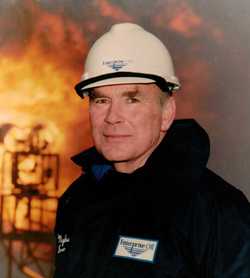 Pioneer of North Sea Oil who discovered the Brent and Nelson oilfields
Pioneer of North Sea Oil who discovered the Brent and Nelson oilfields
John Myles Bowen died at his home near Newton Abbot, Devon, England. Myles, as he was universally known, was born on a farm in Kent in 1928, called up in 1946,commissioned into the Royal Artillery in 1947 and then studied forestry at Oxford, quickly switching to Geology, graduating with First Class honours in 1951. A PhD at Edinburgh followed in 1954.
Myles then joined Royal Dutch Shell and was sent first to Borneo and then to Venezuela. In 1960 he was then assigned to “well sit” Slochteren-2 in the Netherlands, the giant Groningen gas field discovery well. After marrying Margaret Guthrie he was posted to Nigeria before returning to Venezuela as Exploration Manager.
In 1969 he was moved to the UK as the Exploration Manager of Shell Expro. The southern North Sea gas basin fields had been discovered and the prevailing view was that there was no oil in the northern part of the North Sea. Myles was not so sure. His staff identified a vast tilted fault block on poor quality seismic in Block 211/29 far north of any previous activity. They applied for and were awarded the block in the 3rd UK licensing round. It was drilled in June 1971 and made the giant Brent oilfield discovery. The subsequent 4th round of licensing involved cash bids for blocks for the first and, in public, last time. Shell kept the Brent oil discovery a secret so it caused quite a sensation when they bid £21 million for an adjacent block, especially as the next highest bid was £8 million. The first well on this “Golden Block” was dry, and it required a second well to prove that the bid had been justified.
After eight successful years in the UK Myles was assigned to Billiton, a Shell metals subsidiary, as an Exploration Vice President and expanded metal exploration from six to 22 countries.
He retired from Shell in 1982 after 30 years’ service. Myles was immediately appointed Exploration Director of the newly formed Enterprise Oil Company. In the first five years a series of acquisitions increased the company’s acreage, reserves, production, exploration activity and its market capitalisation by approximately five times. His best deal was acquiring a 100% interest in a block in which a dry hole had already been drilled by Shell and Gulf Oil. Re-examination of the data revealed that the first well discovered what became known as the Nelson field.
Myles finally retired in 1992 to live in South Devon where he pursued his hobbies of ocean sailing, motorcycling, tractor driving and local community matters.
Myles will be remembered for his generosity and guidance and instinct for finding petroleum. He had fine judgement, perseverance, humility, and humour. He was a great communicator, teacher and counsellor. He was awarded the Geological Society Petroleum Group Silver Medal, the American Association of Petroleum Geologists’ Pioneer Award. He was even awarded the OBE.
He is survived by Margaret, his wife of 52 years, and their three daughters.
By Dick Selley and Andrew Armour